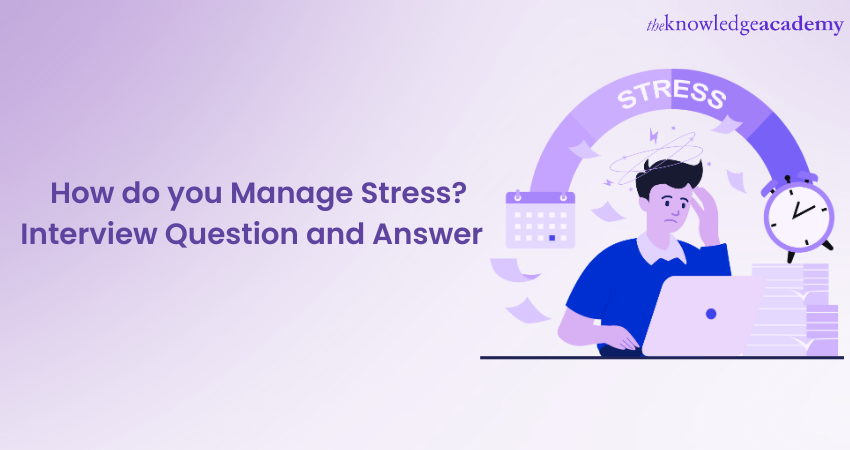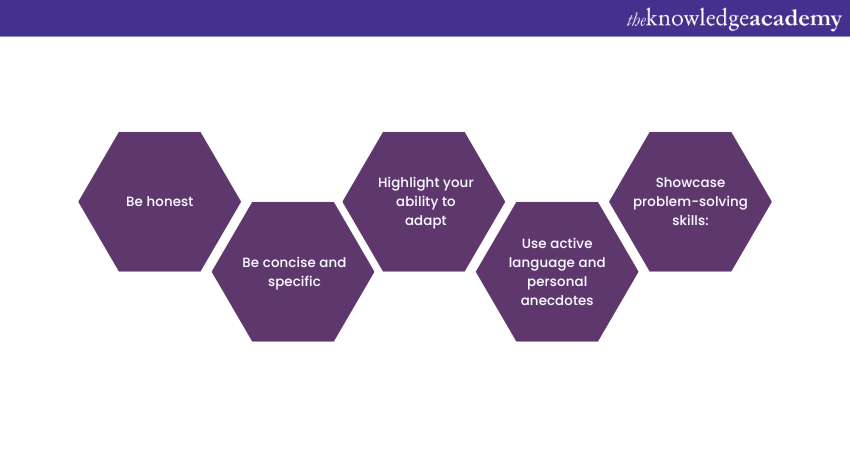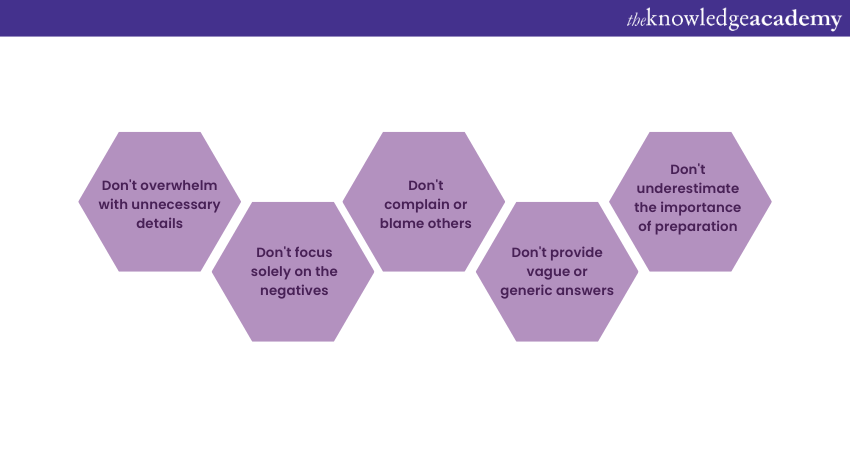We may not have the course you’re looking for. If you enquire or give us a call on +36 18508731 and speak to our training experts, we may still be able to help with your training requirements.
Training Outcomes Within Your Budget!
We ensure quality, budget-alignment, and timely delivery by our expert instructors.

The modern competitive job market has ensured that interviews are designed to assess not only a candidate's technical skills but also their ability to handle various challenges. One of the most common interview questions is, "How Do You Manage Stress?" This question provides an opportunity for candidates to show their resilience, problem-solving abilities, and Time Management skills. In this blog, we will discuss effective strategies for answering the "How Do You Manage Stress” Interview Question confidently and impressively.
Table of Contents
1) Things you need to keep in mind while answering “How Do You Manage Stress” Interview Questions
a) Understanding and addressing the interview questions
b) Showcasing key skills and qualities
c) Preparing examples and scenarios
d) Framing structured answers
e) Emphasising self-care and coping mechanisms
f) Presenting confidence and positivity
g) Addressing the importance of communication and support
h) Dos and don’ts for answering the interview questions
2) Conclusion
Things you need to keep in mind while answering “How Do You Manage Stress” Interview Questions
This section will elaborate on several things that you must keep in mind while answering the “How Do You Manage Stress” Interview Questions.
Understanding and addressing the interview questions
Before diving into crafting a compelling response, it's essential to understand the intention behind the question. Hiring Managers ask these interview questions to assess how well you cope with pressure, adapt to changing circumstances, and maintain your productivity in challenging situations. These interview questions allow them to gauge your emotional intelligence, problem-solving skills, and ability to work well under stress.
Addressing the interview question about stress is of paramount importance as it provides you with an opportunity to showcase your ability to handle pressure and challenges effectively. Interviewers value candidates who can maintain their composure and deliver results even in demanding situations. By addressing stress proactively, you can demonstrate your suitability for the role and increase your chances of success in the interview.

Showcasing key skills and qualities
To answer the Stress Management interview questions effectively, it's important to identify and highlight the key skills and qualities that interviewers look for when evaluating Stress Management capabilities. Here are some essential skills and qualities you need to demonstrate in the interview:
1) Resilience: One can describe resilience as the ability to bounce back from tough situations and maintain a positive attitude. It involves staying composed, adapting to change, and finding solutions despite challenges. While answering the interview questions, you must highlight instances where you faced adversity and overcame it, demonstrating your ability to handle stress with grace and determination.
2) Problem-solving abilities: Effective problem-solving is crucial when dealing with stressful situations. Interviewers value candidates who can think critically, analyse problems, and come up with practical solutions to their questions. Share examples during the interview that showcase your problem-solving skills and highlight how you tackled complex issues under pressure.
3) Time Management skills: Being able to manage your time efficiently is key to handling stress. During your interview, the interviewers use their questions to gauge whether you can prioritise tasks, set realistic deadlines, and maintain a balanced workload. Discuss how you organise your time, use productivity techniques, and meet deadlines even in high-pressure situations.
4) Adaptability: Adaptability, or the ability to adapt to changing circumstances, is highly valued in today's dynamic work environments. Showcasing your adaptability in the interview demonstrates that you can handle unexpected challenges and thrive in fast-paced situations. During the interview, make sure to discuss situations where you had to quickly adjust your plans or strategies to overcome obstacles.
5) Emotional intelligence: One can define emotional intelligence as the ability to understand as well as manage your own emotions, as well as empathise with others. Interviewers look for candidates who can stay calm and composed during stressful situations while also demonstrating empathy towards colleagues or team members. Use the interview to highlight instances where you showcased emotional intelligence by remaining level-headed and supportive in challenging circumstances.
6) Communication skills: Strong communication skills are vital when dealing with stress, as effective communication helps manage expectations, resolve conflicts, and seek support. Use the interview to discuss how you communicate your needs, concerns, and ideas clearly and assertively. Highlight instances where your communication skills played a crucial role in resolving stressful situations.
7) Positive attitude: Maintaining a positive attitude in the face of stress is important. Interviewers seek candidates who can stay optimistic, inspire others, and find silver linings in difficult situations. During the interview, share examples of how you approached stressful circumstances with a positive mindset, focusing on solutions rather than dwelling on the challenges.
Want to build resilience and master Stress Management techniques to thrive in challenging times? Join our Handle Stress and Develop Your Resilience Course today!
Preparing examples and scenarios
To answer the interview questions confidently, it's beneficial to prepare relevant examples and scenarios that demonstrate your ability to handle stress effectively. Reflect on your past experiences, both personal and professional, and identify instances where you successfully managed stress. These examples will serve as the foundation of your response.
Framing a structured response
When answering the interview questions on how you handle stress in an interview, it's crucial to present your answers in a structured manner. This not only helps you convey your thoughts clearly but also demonstrates your ability to organise information effectively. Here is a more detailed breakdown of how to frame a structured response in your interview:
1) Opening statement: Begin your answer with a concise opening statement that sets the context for your answer. For example, you could say, "Handling stress is an integral part of my professional journey, and I believe this interview is an opportunity to showcase my resilience and problem-solving skills."
2) Providing a relevant example: Follow your opening statement with a specific example that illustrates a time when you encountered a stressful situation. It's important to choose an example that is relevant to the job you're applying for. This could be a work-related scenario, such as a tight deadline or a challenging project, or a situation from your personal life where you had to manage stress effectively.
3) Discussing the approach: After presenting the situation, elaborate on the approach you took to address the stress. Explain the steps you followed, the strategies you implemented, and the decisions you made. Emphasise your problem-solving abilities and how you adapted to the situation. Use the interview as an opportunity to highlight your critical thinking skills and demonstrate your ability to remain calm under pressure.
4) Highlighting positive outcomes: Next, focus on the positive outcomes or results that were achieved as a result of effective Stress Management. Use the interview to discuss how your actions contributed to the success of the situation, whether it led to meeting the deadline, resolving a conflict, or surpassing expectations. This showcases your ability to turn stressful situations into opportunities for growth and success.
You must remember to tailor your interview answers according to the specific job requirements and company culture. Each example and approach should be aligned with the skills and qualities that the interviewer is seeking. Practice delivering your answers confidently, using concise language and maintaining a positive and enthusiastic tone. Incorporating these elements into your structured answers to the interview questions will help you present yourself as a capable candidate who can handle stress effectively and, therefore, contribute to the success of the organisation.
Take control of your stress levels and enhance your well-being with our comprehensive Stress Management Training Course – sign up now!
Emphasising self-care and coping mechanisms
In addition to showcasing your problem-solving abilities during your interview, it's important to emphasise the role of self-care and coping mechanisms in handling stress. Use the interview as an opportunity to discuss how you prioritise self-care, such as practising mindfulness, maintaining a healthy balance between work and life, as well as engaging in activities that help you recharge.
Presenting confidence and positivity
When answering the interview questions, it's crucial to convey confidence and positivity. Maintain a composed and enthusiastic tone throughout your response. By exuding confidence in your interview, you demonstrate your ability to handle stress effectively and inspire confidence in your potential employers.
Addressing the importance of communication and support
Acknowledge the significance of communication and support in managing stress. Use the interview to highlight how you actively seek help or collaborate with team members during challenging times. Your attitude in the interview will demonstrate your ability to build strong relationships, seek guidance, and foster a supportive work environment.
Dos and don’ts for answering the interview questions
When answering the interview questions on how you handle stress, it's important to keep in mind certain dos and don'ts to ensure your answers are effective and leave a positive impression. Here are some guidelines to follow in your interview:

1) Dos:
a) Be honest: Provide a genuine and honest response that reflects your true experiences and capabilities. Authenticity is key to building trust with the interviewer.
b) Be concise and specific: Keep your response focused and concise. Provide specific examples and anecdotes during your interview that clearly illustrate your ability to handle stress in different situations.
c) Highlight your ability to adapt: Use the interview to emphasise your adaptability and flexibility in stressful scenarios. Showcase your capacity to adjust plans, think on your feet, and find solutions in changing circumstances.
d) Use active language and personal anecdotes: Make your answers engaging by using active language and personal anecdotes. This helps the interviewer connect with your experiences and see how you personally handled stressful situations.
e) Showcase problem-solving skills: Discuss how you approach problems when faced with stress. Use the interview to highlight your analytical thinking, decision-making abilities, and how you work through challenges to reach successful outcomes

2) Don'ts:
a) Don't overwhelm with unnecessary details: Avoid going into excessive detail or providing irrelevant information. Remember to focus on the key points and keep your answer concise to maintain the interviewer's attention.
b) Don't focus solely on the negatives: While it's important to acknowledge the existence of stress, don't dwell solely on the negative aspects. Instead, use the interview to focus on how you effectively manage and overcome stress, turning it into an opportunity for growth.
c) Don't complain or blame others: Avoid blaming others or complaining about past stressful situations in your interview. Instead, maintain a positive and proactive tone, showcasing your ability to take ownership and find constructive solutions.
d) Don't provide vague or generic answers: Generic answers that lack specific details won't leave a lasting impression on your interviewer. Ensure your answer is tailored to your own experiences and showcases the unique skills and qualities you possess.
e) Don't underestimate the importance of preparation: Don't go into the interview without preparation. Take the time to reflect on your experiences, identify relevant examples, and practice delivering your response. This preparation for the interview will help you present well-structured and confident answers.
Conclusion
In conclusion, answering the "How Do You Manage Stress?" Interview Question is an opportunity to demonstrate your ability to thrive in challenging situations. By highlighting your resilience, problem-solving abilities, Time Management skills, and self-care strategies, you can impress potential employers and increase your chances of securing the job. Lastly, you must remember to practice your answers to possible questions, maintain a confident tone, and showcase your unique qualities to leave a lasting impression.
Want to unlock your full potential and embark on a journey of personal growth? Sign up for our transformative Personal Development Training Courses today!
Frequently Asked Questions
Upcoming Business Skills Resources Batches & Dates
Date
 Stress Management Course
Stress Management Course
Fri 17th Jan 2025
Fri 21st Mar 2025
Fri 16th May 2025
Fri 18th Jul 2025
Fri 19th Sep 2025
Fri 21st Nov 2025







 Top Rated Course
Top Rated Course


 If you wish to make any changes to your course, please
If you wish to make any changes to your course, please


